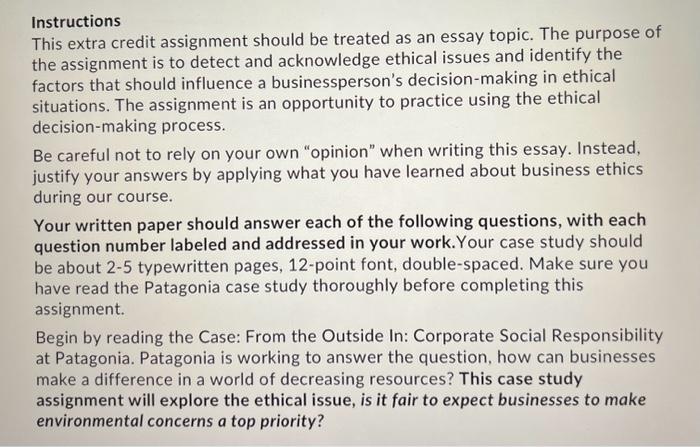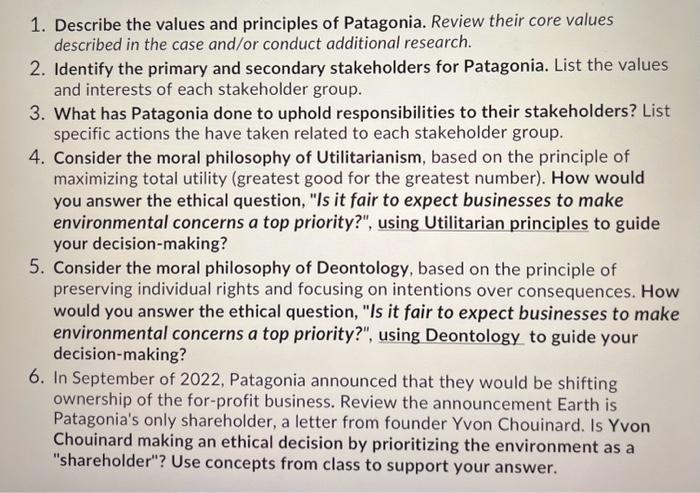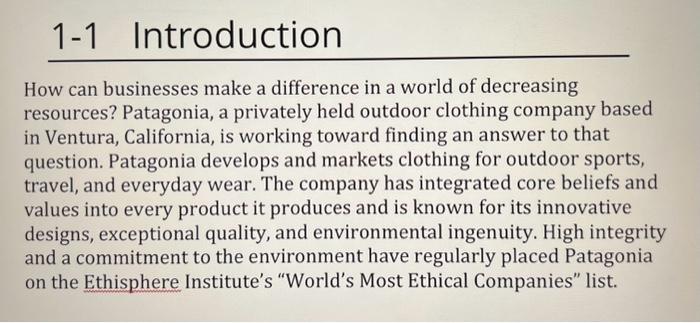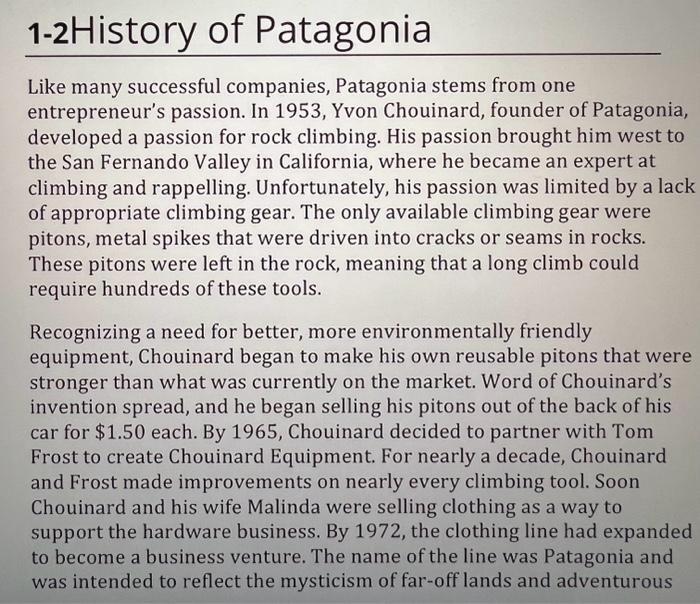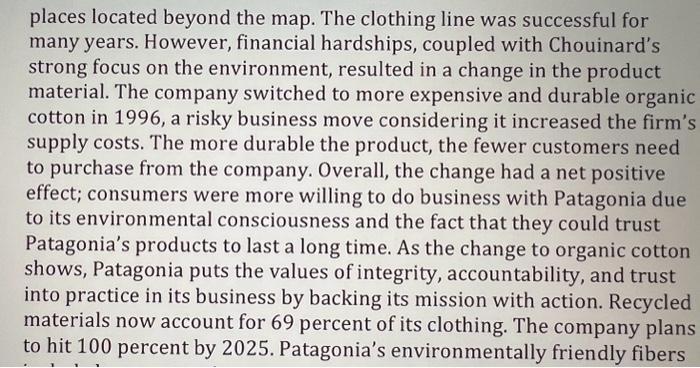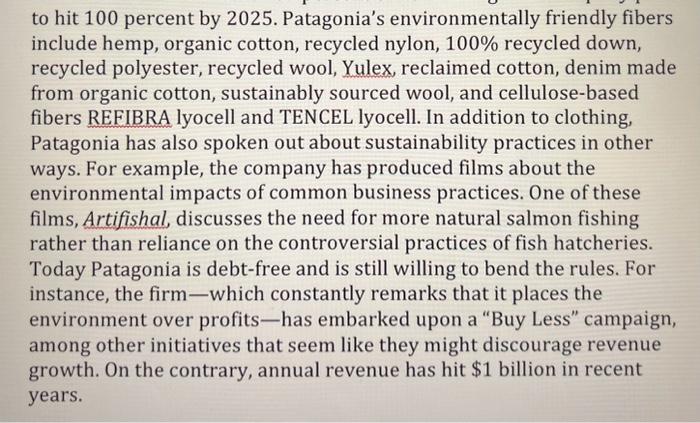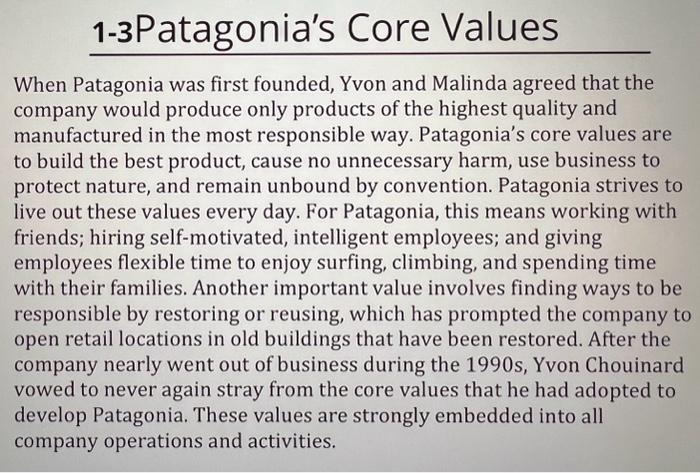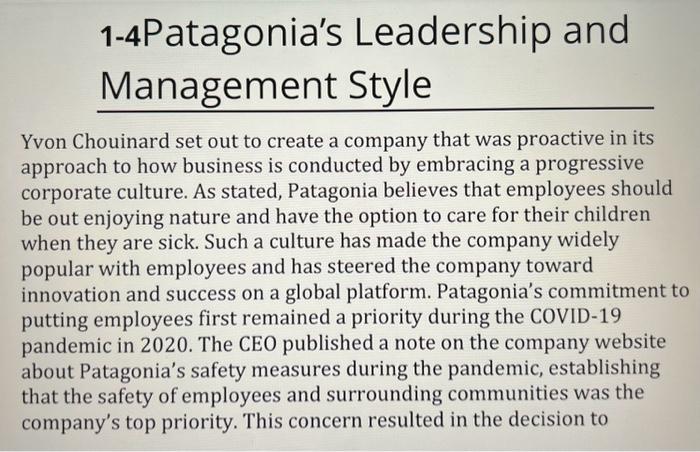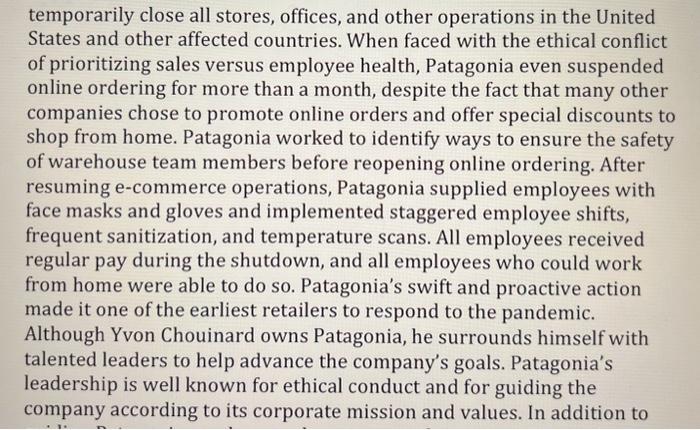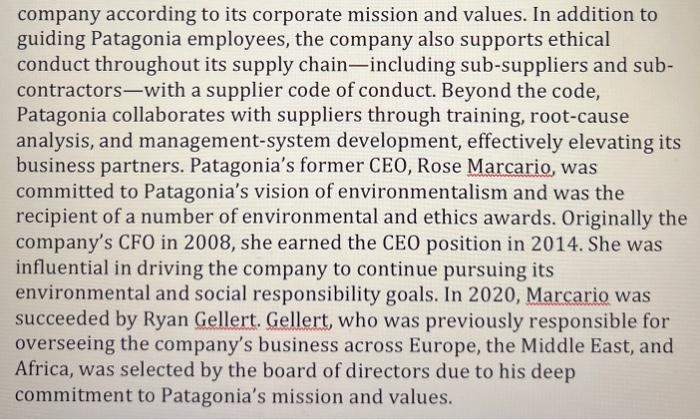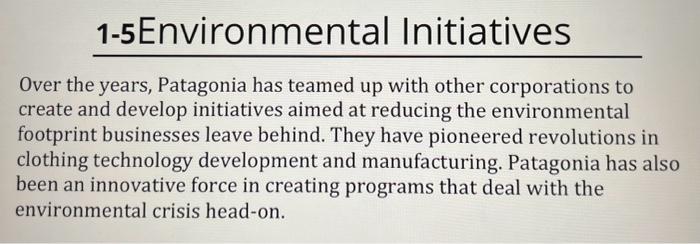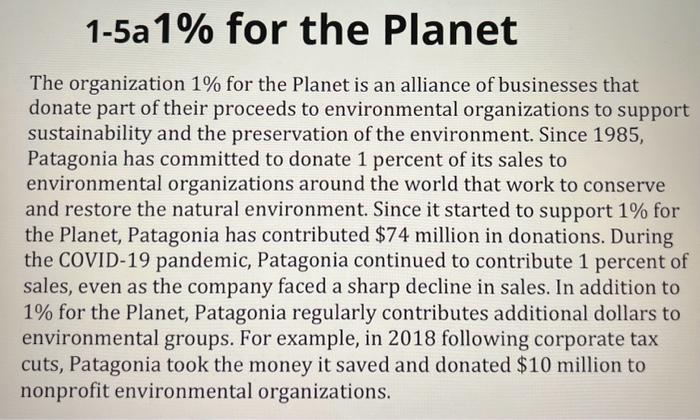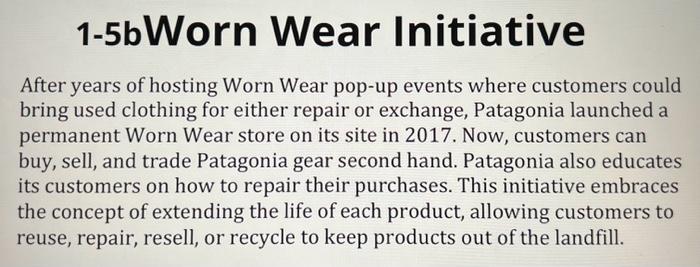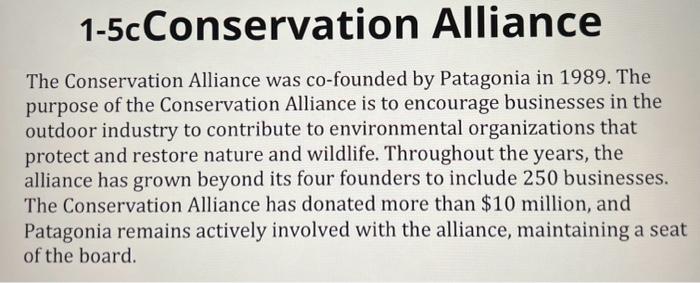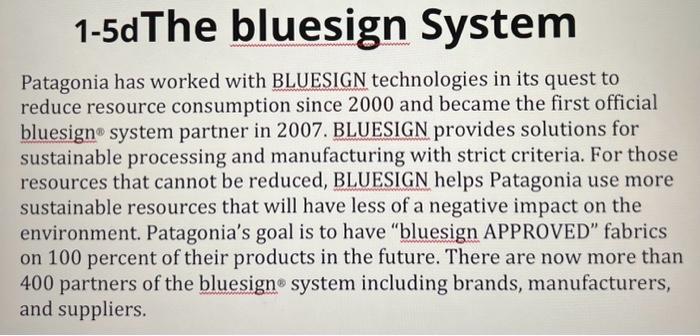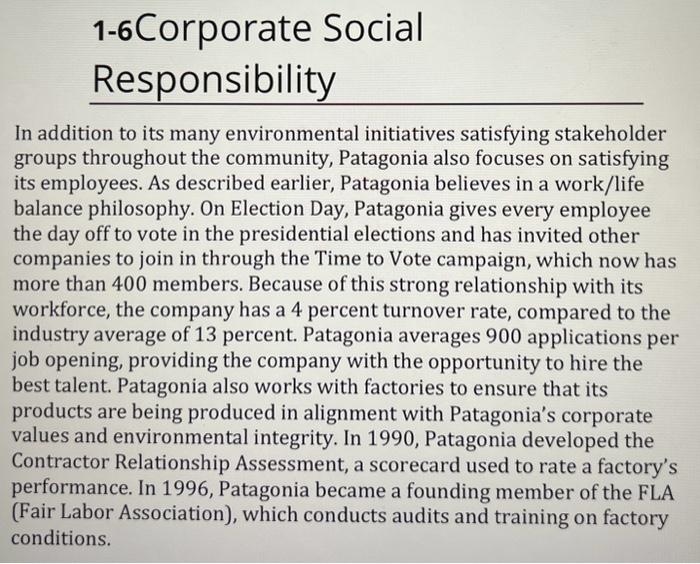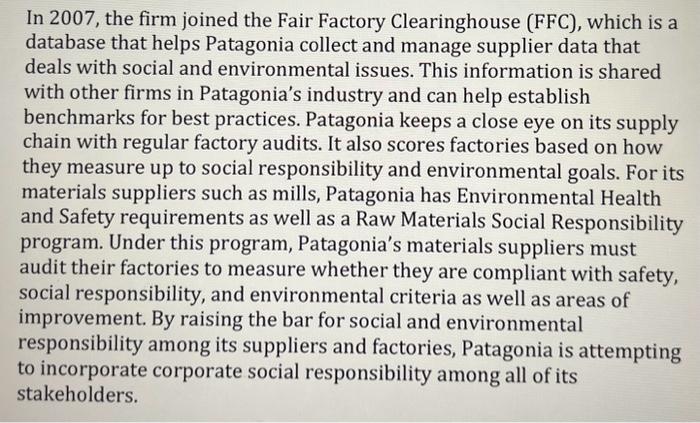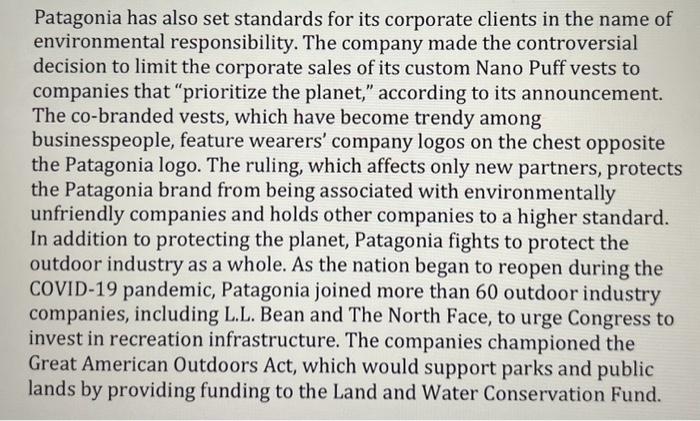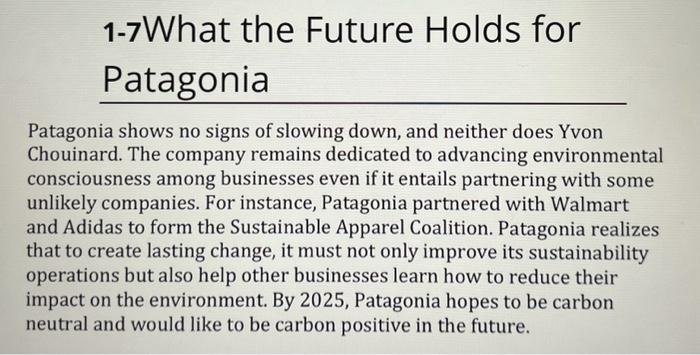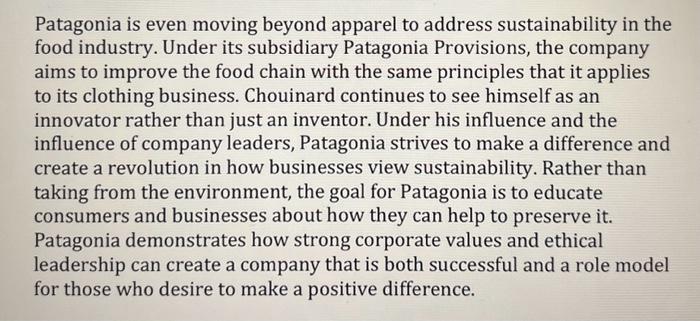Need help with this extra credit assignment! Please only do if you have the time to help out with the longer assignment! Will leave a like! Thank you!!!
Case to read
Thanks again!!
Instructions This extra credit assignment should be treated as an essay topic. The purpose of the assignment is to detect and acknowledge ethical issues and identify the factors that should influence a businessperson's decision-making in ethical situations. The assignment is an opportunity to practice using the ethical decision-making process. Be careful not to rely on your own "opinion" when writing this essay. Instead, justify your answers by applying what you have learned about business ethics during our course. Your written paper should answer each of the following questions, with each question number labeled and addressed in your work.Your case study should be about 2-5 typewritten pages, 12-point font, double-spaced. Make sure you have read the Patagonia case study thoroughly before completing this assignment. Begin by reading the Case: From the Outside In: Corporate Social Responsibility at Patagonia. Patagonia is working to answer the question, how can businesses make a difference in a world of decreasing resources? This case study assignment will explore the ethical issue, is it fair to expect businesses to make environmental concerns a top priority? 1. Describe the values and principles of Patagonia. Review their core values described in the case and/or conduct additional research. 2. Identify the primary and secondary stakeholders for Patagonia. List the values and interests of each stakeholder group. 3. What has Patagonia done to uphold responsibilities to their stakeholders? List specific actions the have taken related to each stakeholder group. 4. Consider the moral philosophy of Utilitarianism, based on the principle of maximizing total utility (greatest good for the greatest number). How would you answer the ethical question, "Is it fair to expect businesses to make environmental concerns a top priority?", using Utilitarian principles to guide your decision-making? 5. Consider the moral philosophy of Deontology, based on the principle of preserving individual rights and focusing on intentions over consequences. How would you answer the ethical question, "Is it fair to expect businesses to make environmental concerns a top priority?", using Deontology to guide your decision-making? 6. In September of 2022, Patagonia announced that they would be shifting ownership of the for-profit business. Review the announcement Earth is Patagonia's only shareholder, a letter from founder Yvon Chouinard. Is Yvon Chouinard making an ethical decision by prioritizing the environment as a "shareholder"? Use concepts from class to support your answer. How can businesses make a difference in a world of decreasing resources? Patagonia, a privately held outdoor clothing company based in Ventura, California, is working toward finding an answer to that question. Patagonia develops and markets clothing for outdoor sports, travel, and everyday wear. The company has integrated core beliefs and values into every product it produces and is known for its innovative designs, exceptional quality, and environmental ingenuity. High integrity and a commitment to the environment have regularly placed Patagonia on the Ethisphere Institute's "World's Most Ethical Companies" list. Like many successful companies, Patagonia stems from one entrepreneur's passion. In 1953, Yvon Chouinard, founder of Patagonia, developed a passion for rock climbing. His passion brought him west to the San Fernando Valley in California, where he became an expert at climbing and rappelling. Unfortunately, his passion was limited by a lack of appropriate climbing gear. The only available climbing gear were pitons, metal spikes that were driven into cracks or seams in rocks. These pitons were left in the rock, meaning that a long climb could require hundreds of these tools. Recognizing a need for better, more environmentally friendly equipment, Chouinard began to make his own reusable pitons that were stronger than what was currently on the market. Word of Chouinard's invention spread, and he began selling his pitons out of the back of his car for $1.50 each. By 1965 , Chouinard decided to partner with Tom Frost to create Chouinard Equipment. For nearly a decade, Chouinard and Frost made improvements on nearly every climbing tool. Soon Chouinard and his wife Malinda were selling clothing as a way to support the hardware business. By 1972, the clothing line had expanded to become a business venture. The name of the line was Patagonia and was intended to reflect the mysticism of far-off lands and adventurous places located beyond the map. The clothing line was successful for many years. However, financial hardships, coupled with Chouinard's strong focus on the environment, resulted in a change in the product material. The company switched to more expensive and durable organic cotton in 1996, a risky business move considering it increased the firm's supply costs. The more durable the product, the fewer customers need to purchase from the company. Overall, the change had a net positive effect; consumers were more willing to do business with Patagonia due to its environmental consciousness and the fact that they could trust Patagonia's products to last a long time. As the change to organic cotton shows, Patagonia puts the values of integrity, accountability, and trust into practice in its business by backing its mission with action. Recycled materials now account for 69 percent of its clothing. The company plans to hit 100 percent by 2025. Patagonia's environmentally friendly fibers to hit 100 percent by 2025 . Patagonia's environmentally friendly fibers include hemp, organic cotton, recycled nylon, 100% recycled down, recycled polyester, recycled wool, Yulex, reclaimed cotton, denim made from organic cotton, sustainably sourced wool, and cellulose-based fibers REFIBRA lyocell and TENCEL lyocell. In addition to clothing, Patagonia has also spoken out about sustainability practices in other ways. For example, the company has produced films about the environmental impacts of common business practices. One of these films, Artifishal, discusses the need for more natural salmon fishing rather than reliance on the controversial practices of fish hatcheries. Today Patagonia is debt-free and is still willing to bend the rules. For instance, the firm - which constantly remarks that it places the environment over profits - has embarked upon a "Buy Less" campaign, among other initiatives that seem like they might discourage revenue growth. On the contrary, annual revenue has hit $1 billion in recent years. When Patagonia was first founded, Yvon and Malinda agreed that the company would produce only products of the highest quality and manufactured in the most responsible way. Patagonia's core values are to build the best product, cause no unnecessary harm, use business to protect nature, and remain unbound by convention. Patagonia strives to live out these values every day. For Patagonia, this means working with friends; hiring self-motivated, intelligent employees; and giving employees flexible time to enjoy surfing, climbing, and spending time with their families. Another important value involves finding ways to be responsible by restoring or reusing, which has prompted the company to open retail locations in old buildings that have been restored. After the company nearly went out of business during the 1990s, Yvon Chouinard vowed to never again stray from the core values that he had adopted to develop Patagonia. These values are strongly embedded into all company operations and activities. 1-4Patagonia's Leadership and Management Style Yvon Chouinard set out to create a company that was proactive in its approach to how business is conducted by embracing a progressive corporate culture. As stated, Patagonia believes that employees should be out enjoying nature and have the option to care for their children when they are sick. Such a culture has made the company widely popular with employees and has steered the company toward innovation and success on a global platform. Patagonia's commitment to putting employees first remained a priority during the COVID-19 pandemic in 2020. The CEO published a note on the company website about Patagonia's safety measures during the pandemic, establishing that the safety of employees and surrounding communities was the company's top priority. This concern resulted in the decision to temporarily close all stores, offices, and other operations in the United States and other affected countries. When faced with the ethical conflict of prioritizing sales versus employee health, Patagonia even suspended online ordering for more than a month, despite the fact that many other companies chose to promote online orders and offer special discounts to shop from home. Patagonia worked to identify ways to ensure the safety of warehouse team members before reopening online ordering. After resuming e-commerce operations, Patagonia supplied employees with face masks and gloves and implemented staggered employee shifts, frequent sanitization, and temperature scans. All employees received regular pay during the shutdown, and all employees who could work from home were able to do so. Patagonia's swift and proactive action made it one of the earliest retailers to respond to the pandemic. Although Yvon Chouinard owns Patagonia, he surrounds himself with talented leaders to help advance the company's goals. Patagonia's leadership is well known for ethical conduct and for guiding the company according to its corporate mission and values. In addition to company according to its corporate mission and values. In addition to guiding Patagonia employees, the company also supports ethical conduct throughout its supply chain-including sub-suppliers and subcontractors - with a supplier code of conduct. Beyond the code, Patagonia collaborates with suppliers through training, root-cause analysis, and management-system development, effectively elevating its business partners. Patagonia's former CEO, Rose Marcario, was committed to Patagonia's vision of environmentalism and was the recipient of a number of environmental and ethics awards. Originally the company's CFO in 2008, she earned the CEO position in 2014. She was influential in driving the company to continue pursuing its environmental and social responsibility goals. In 2020, Marcario was succeeded by Ryan Gellert. Gellert, who was previously responsible for overseeing the company's business across Europe, the Middle East, and Africa, was selected by the board of directors due to his deep commitment to Patagonia's mission and values. Over the years, Patagonia has teamed up with other corporations to create and develop initiatives aimed at reducing the environmental footprint businesses leave behind. They have pioneered revolutions in clothing technology development and manufacturing. Patagonia has also been an innovative force in creating programs that deal with the environmental crisis head-on. The organization 1% for the Planet is an alliance of businesses that donate part of their proceeds to environmental organizations to support sustainability and the preservation of the environment. Since 1985, Patagonia has committed to donate 1 percent of its sales to environmental organizations around the world that work to conserve and restore the natural environment. Since it started to support 1% for the Planet, Patagonia has contributed \$74 million in donations. During the COVID-19 pandemic, Patagonia continued to contribute 1 percent of sales, even as the company faced a sharp decline in sales. In addition to 1% for the Planet, Patagonia regularly contributes additional dollars to environmental groups. For example, in 2018 following corporate tax cuts, Patagonia took the money it saved and donated $10 million to nonprofit environmental organizations. 1-5bvvorn vvear initaative After years of hosting Worn Wear pop-up events where customers could bring used clothing for either repair or exchange, Patagonia launched a permanent Worn Wear store on its site in 2017. Now, customers can buy, sell, and trade Patagonia gear second hand. Patagonia also educates its customers on how to repair their purchases. This initiative embraces the concept of extending the life of each product, allowing customers to reuse, repair, resell, or recycle to keep products out of the landfill. 1-5cConservation Alliance The Conservation Alliance was co-founded by Patagonia in 1989. The purpose of the Conservation Alliance is to encourage businesses in the outdoor industry to contribute to environmental organizations that protect and restore nature and wildlife. Throughout the years, the alliance has grown beyond its four founders to include 250 businesses. The Conservation Alliance has donated more than $10 million, and Patagonia remains actively involved with the alliance, maintaining a seat of the board. Patagonia has worked with BLUESIGN technologies in its quest to reduce resource consumption since 2000 and became the first official bluesign system partner in 2007. BLUESIGN provides solutions for sustainable processing and manufacturing with strict criteria. For those resources that cannot be reduced, BLUESIGN helps Patagonia use more sustainable resources that will have less of a negative impact on the environment. Patagonia's goal is to have "bluesign APPROVED" fabrics on 100 percent of their products in the future. There are now more than 400 partners of the bluesign system including brands, manufacturers, and suppliers. 1-6Corporate Social Responsibility In addition to its many environmental initiatives satisfying stakeholder groups throughout the community, Patagonia also focuses on satisfying its employees. As described earlier, Patagonia believes in a work/life balance philosophy. On Election Day, Patagonia gives every employee the day off to vote in the presidential elections and has invited other companies to join in through the Time to Vote campaign, which now has more than 400 members. Because of this strong relationship with its workforce, the company has a 4 percent turnover rate, compared to the industry average of 13 percent. Patagonia averages 900 applications per job opening, providing the company with the opportunity to hire the best talent. Patagonia also works with factories to ensure that its products are being produced in alignment with Patagonia's corporate values and environmental integrity. In 1990, Patagonia developed the Contractor Relationship Assessment, a scorecard used to rate a factory's performance. In 1996, Patagonia became a founding member of the FLA (Fair Labor Association), which conducts audits and training on factory conditions. In 2007 , the firm joined the Fair Factory Clearinghouse (FFC), which is a database that helps Patagonia collect and manage supplier data that deals with social and environmental issues. This information is shared with other firms in Patagonia's industry and can help establish benchmarks for best practices. Patagonia keeps a close eye on its supply chain with regular factory audits. It also scores factories based on how they measure up to social responsibility and environmental goals. For its materials suppliers such as mills, Patagonia has Environmental Health and Safety requirements as well as a Raw Materials Social Responsibility program. Under this program, Patagonia's materials suppliers must audit their factories to measure whether they are compliant with safety, social responsibility, and environmental criteria as well as areas of improvement. By raising the bar for social and environmental responsibility among its suppliers and factories, Patagonia is attempting to incorporate corporate social responsibility among all of its stakeholders. Patagonia has also set standards for its corporate clients in the name of environmental responsibility. The company made the controversial decision to limit the corporate sales of its custom Nano Puff vests to companies that "prioritize the planet," according to its announcement. The co-branded vests, which have become trendy among businesspeople, feature wearers' company logos on the chest opposite the Patagonia logo. The ruling, which affects only new partners, protects the Patagonia brand from being associated with environmentally unfriendly companies and holds other companies to a higher standard. In addition to protecting the planet, Patagonia fights to protect the outdoor industry as a whole. As the nation began to reopen during the COVID-19 pandemic, Patagonia joined more than 60 outdoor industry companies, including L.L. Bean and The North Face, to urge Congress to invest in recreation infrastructure. The companies championed the Great American Outdoors Act, which would support parks and public lands by providing funding to the Land and Water Conservation Fund. 1-7What the Future Holds for Patagonia Patagonia shows no signs of slowing down, and neither does Yvon Chouinard. The company remains dedicated to advancing environmental consciousness among businesses even if it entails partnering with some unlikely companies. For instance, Patagonia partnered with Walmart and Adidas to form the Sustainable Apparel Coalition. Patagonia realizes that to create lasting change, it must not only improve its sustainability operations but also help other businesses learn how to reduce their impact on the environment. By 2025, Patagonia hopes to be carbon neutral and would like to be carbon positive in the future. Patagonia is even moving beyond apparel to address sustainability in the food industry. Under its subsidiary Patagonia Provisions, the company aims to improve the food chain with the same principles that it applies to its clothing business. Chouinard continues to see himself as an innovator rather than just an inventor. Under his influence and the influence of company leaders, Patagonia strives to make a difference and create a revolution in how businesses view sustainability. Rather than taking from the environment, the goal for Patagonia is to educate consumers and businesses about how they can help to preserve it. Patagonia demonstrates how strong corporate values and ethical leadership can create a company that is both successful and a role model for those who desire to make a positive difference
